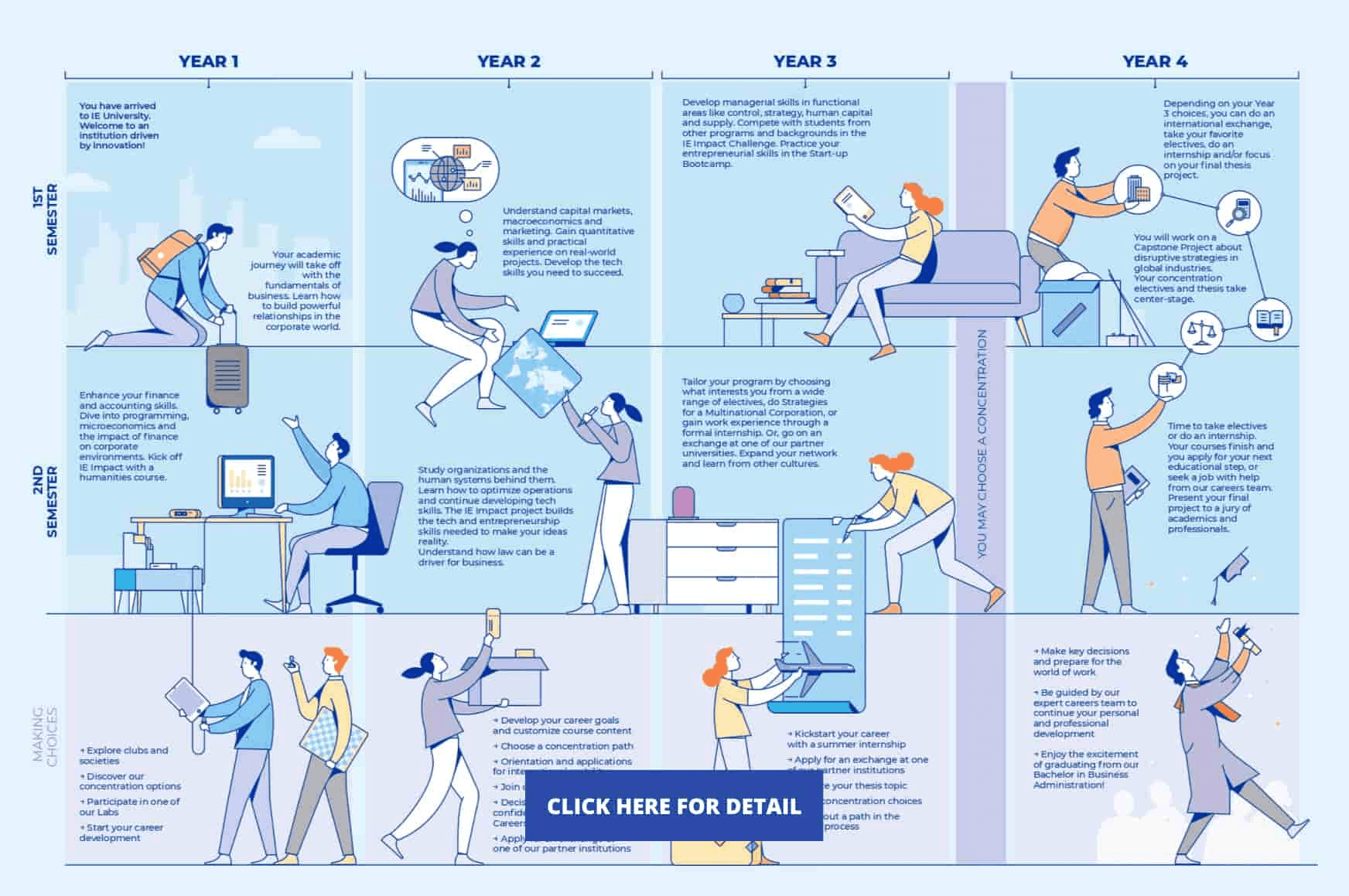
Bachelor in Business Administration
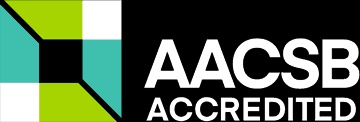
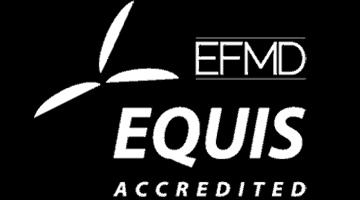
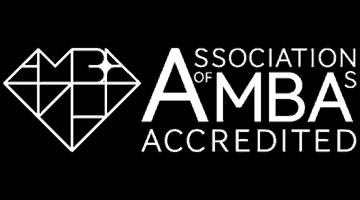
- Home
- Studies
- Undergraduate Degrees
- Bachelor In Business Administration
A UNIQUE BACHELOR IN BUSINESS ADMINISTRATION
The study plan for the Bachelor in Business Administration at IE University has been designed with the prestigious academic experience at its core, our academic faculty’s expert knowledge and research in each area, and the linkages between the University and the professional world.
The Bachelor in Business Administration aims to teach young ambitious individuals to build the proper skill set to become professionals capable of facing real-world challenges.
Through our hands-on teaching methodology, students from the Bachelor in Business Administration will find the perfect ideal balance between what is studied throughout their degree and the projects that are applied based on real-world scenarios.
This will aid them to develop profiles that are able to adapt to new trends happening now in the 21st century.

BACHELOR IN BUSINESS ADMINISTRATION STUDY PLAN
LEARN MORE ABOUT OUR BACHELOR IN BUSINESS ADMINISTRATION

FIRST YEAR
The first year is designed to build a foundation for a successful BBA journey through the development of essential knowledge, skills and personal insights. Students are tested for levels of development, learn about expectations and standards, and become familiar with the values of IE including humanities, entrepreneurship and international collaboration. The curriculum covers key business subjects and introduces essential context and appreciation for the wider world in which business operates.

SECOND YEAR
The second year of the BBA builds on the foundational blocks in year 1, and introduces a number of practical courses which tests and develops the student’s skills and approach to business. Fundamental subjects become more complex and there is a strong element of finance and numeracy. Practical projects in entrepreneurship and marketing expose students to the world of work and delivering results in teams. Students become more aware of the choices they need to make for years 3 and 4, and are given support by our academic teams in identifying key areas for development in order to succeed in specific early career paths. The introduction of technology courses shows the University´s commitment to cross-disciplinary learning and insight into innovation.
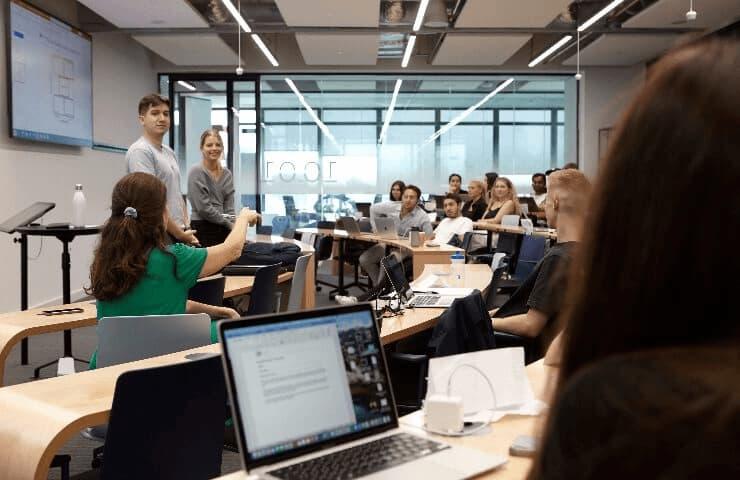
THIRD YEAR
Students will continue the compulsory track in semester one, with subjects such as strategy and supply chain management which can build on the foundational courses of the first two years. These subjects benefit from the knowledge and experiences in the first half of the BBA. A practical assignment which consists of a cross-university Challenge project will help students applied what they have learned and combine with other subjects. Students continue their journey in semester two with personal choices in electives, study abroad, and internship. They can combine from a wide range of options, to follow their passion for specific subjects and career tracks.

FOURTH YEAR
The final year allows for continued specialization or a broadening experience, at IE University or a partner university. Electives and internships are available in semester one, followed by a final semester which includes the thesis project, a major team assignment, and the capstone strategic course. Students can also choose internships and electives as their final work in the months before graduation. The second semester brings all students on campus one last time, ensuring that the BBA is completed together as a community of learning and to celebrate the achievements from the past four years.
THE BBA LEARNING JOURNEY
The unique learning journey of the Bachelor in Business Administration has been structured in 12 integrated learning blocks that will allow you to explore the management world in a progressive way.
From day one, you will be immersed in a learning journey designed to help you build your own path to success.
BACHELOR IN BUSINESS ADMINISTRATION CONCENTRATIONS
Choosing your own path and personalizing your program is an essential part of your learning journey in the Bachelor in Business Administration. We offer eight different concentrations representing key business pathways so you can adapt your education to your precise needs and career aspirations. In all our concentrations, you’ll learn from industry experts, top academics and real-world professionals who will help you shape a specialized profile capable of tackling the most complex challenges each area faces.
If you already have a clear vision for your future, you can start specializing in your preferred area during the initial two years of your Bachelor in Business Administration. Our tailored approach includes specific activities, personalized career guidance, enlightening seminars and more. In your third year, you'll have the chance to select your first electives, further enriching your knowledge in your chosen domain. As you reach the midpoint of year three, you can choose a concentration for your fourth year, when you will dive even deeper into your selected specialization.

ENTREPRENEURSHIP AND CORPORATE INNOVATION
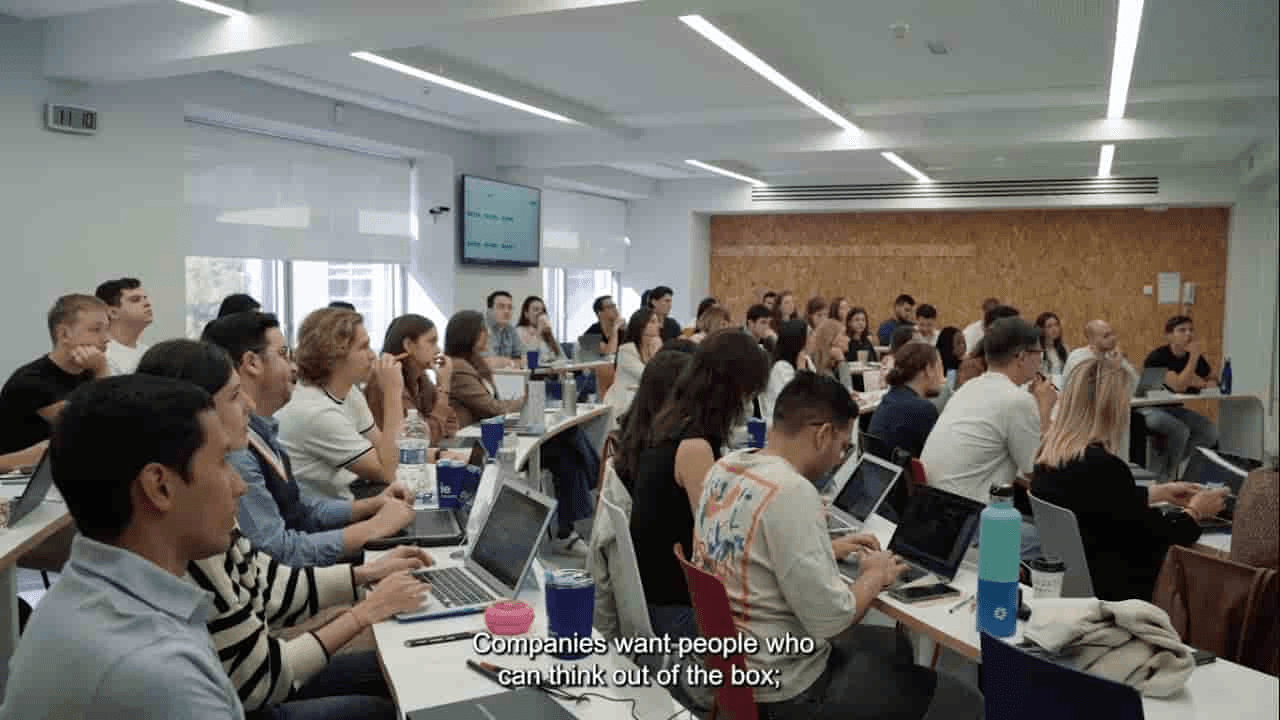
TURN YOUR IDEAS INTO A SOLID PROJECT AND TRANSFORM THE BUSINESS WORLD
The changes occurring today in the business world are a source not only of challenges, but also of opportunities. It’s time to innovate, come up with new business models and look for ideas that will shake up the market. The knowledge you gain in the Bachelor in Business Administration in Entrepreneurship and Corporate Innovation will teach you how to shape your ideas, start your own company and innovate within existing organizations.
If you pursue this concentration, you will conduct an in-depth analysis of all the fundamental areas that make up a company and grasp key management concepts that will empower you to lead your company to success. You can also choose to specialize in different fields depending on the area of activity you want to focus on: corporate entrepreneurship and innovation, financial entrepreneurship, social entrepreneurship and business intelligence for start-up companies, to name a few.
The future of business depends on the vision of emerging entrepreneurs. That’s why we help you adopt a big-picture perspective that will allow you to understand the effects that disruption and digital transformation are having on the business ecosystem. You will be able not only to pursue the concerns of your project, but also to identify the needs of each sector. In this way, you will contribute to transforming the corporate landscape through sustainable, responsible and ethical entrepreneurship, with the ultimate goal of benefitting society as a whole.
IS FOR STUDENTS WHO ARE…
Ambitious, self-assured and clear-minded, who are capable of innovating and are not afraid to break away from the norm. We’re looking for natural leaders who are determined to have a real impact on the business world.
LOOKING FOR…
In-depth knowledge of the entrepreneurial process, an understanding of its impact and weight in the micro and macroeconomic context, the ability to identify business and investment opportunities and a mastery of the necessary tools for strategic management. You will learn how to evaluate ideas, define key objectives and design corporate models. You will discover the different sources of financing available to you, understand how to calculate project costs, and put these concepts into practice by working with real ideas in the classroom.
TO BECOME A…
- Managing Director
- Entrepreneur
- Strategy and Innovation Consultant
- Innovation and Development Manager
- Business Transformation Manager
- Product Manager

DIGITAL BUSINESS, ANALYTICS & OPERATIONS

TURN DIGITAL TRANSFORMATION INTO A BUSINESS OPPORTUNITY
The advancement of new technologies is the factor that has most redefined the business market in recent decades, causing technological development and digital transformation to take on a leading role in organizations across all sectors. Businesses now need professionals who are familiar with the different digital tools on the market, know how to use them, and can identify which are most efficient and best suited to the needs of each company.
The Bachelor in Business Administration in Digital Business, Analysis and Operations provides you with the necessary skills to master business and technology management. You will acquire knowledge of programming, business and software analytics, artificial intelligence, cybersecurity and decision-making in online businesses. Not only will you gain a broad view of the role of technology in the business ecosystem, but also a deep appreciation of the key factors behind its implementation and management. This way, you’ll be equipped to face the digital transformation of the business world—and even to become a driving force behind it.
In such a competitive environment, specialization is key to becoming a sought-after professional. The different electives in this concentration allow you to delve into areas such as technology applied to entrepreneurship or technological management of the corporate environment, giving you the opportunity to develop the highest-level skills. Also, as sustainability and social responsibility are increasingly important issues in most sectors, you will learn how to drive digital transformation from an ethical perspective that contributes to social development.
IS FOR STUDENTS WHO ARE…
Passionate about new technologies and have the ability to solve complex real-world problems. This concentration is aimed at curious, innovation-minded students who are aware of the potential of digitalization.
LOOKING FOR…
A program that teaches you to identify technology trends in the business landscape, understand the strategic value of innovation systems in the corporate context, and gain the essential programming skills to tackle the challenges of the future. You will learn to apply business diagnostic tools and techniques, study the strengths, weaknesses and needs of a company in order to implement tailored solutions, harness the possibilities of data and manage unforeseen situations.
TO BECOME A…
- Business Innovation Manager
- Business Intelligence Manager
- Information Systems Manager
- Technology Consultant
- Digital Transformation Consultant
- Cybersecurity Manager

INTERNATIONAL BUSINESS AND ECONOMICS
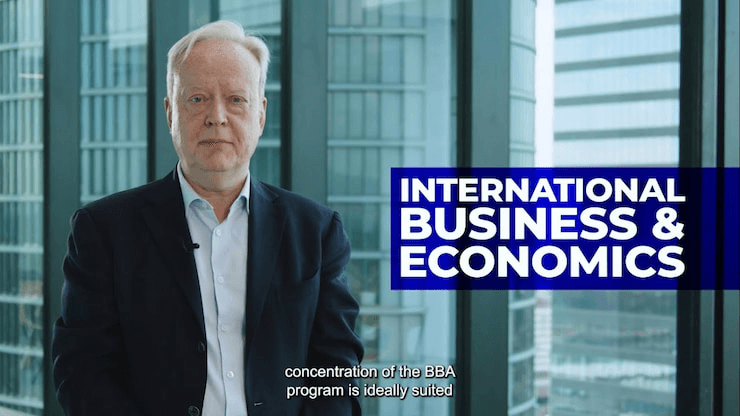
OVERCOME PHYSICAL AND CULTURAL BARRIERS TO ACHIEVE GLOBAL SUCCESS
In a market that is more digital and globalized than ever, it is impossible to understand the role of new managers from anything other than an international perspective. The current landscape is complex, but it also presents enormous opportunities for leaders who have developed a broad and global vision—leaders who are clear about where the greatest competitive advantages lie, which international markets present the greatest risks and how factors such as exchange rate fluctuations affect their company.
In the Bachelor in Business Administration in International Business and Economics, students have the opportunity to study the different economic models of international trade in great depth and analyze the impact of trade policies on the main macroeconomic variables. This well-rounded concentration explores the differences between the various accounting systems and how to adapt them to international standards.
An international leader is able to function successfully in all types of contexts, capable of overcoming physical borders and language and cultural barriers. If you choose this concentration, you will explore the economic and growth differences between countries, discover the principles of international trade and understand the economic risks of international business expansion. You will understand which tools are most effective for ensuring your organization’s worldwide success.
IS FOR STUDENTS WHO ARE…
Internationally ambitious, who see the increasing globalization of the market as an opportunity and have an interest in the economic, social and cultural differences between countries. This concentration is for resolute leaders who are confident and capable of creative thinking.
LOOKING FOR…
The skills and tools necessary to assess the boundaries and opportunities of various foreign markets and seeking to engage in global problem-solving. In the International Economics and Business concentration, you will learn to use professional criteria based on technical instruments to make decisions in a globalized context, identify sources of international income and evaluate the possibilities of companies’ success in specific markets.
TO BECOME A…
- Entrepreneur
- CEO of a company
- Director of International Strategy
- Market Analyst
- International Trade ConsultantImport/Export Director

PRODUCT MANAGEMENT AND SERVICE DESIGN

FIND OUT WHAT YOUR CUSTOMERS NEED AND MAKE YOUR BUSINESS GROW
The rapid transformation of the business market has brought with it a change of mentality. Most business owners now understand that the strategy of any business must be focused on consumers—specifically, on providing them the best possible experience throughout the process of purchasing a product or hiring a service. The design of the customer journey is more essential than ever to improve brand satisfaction levels.
To meet this challenge, companies need executives who understand how their customers think and what their needs and expectations are. The purpose of the Bachelor in Business Administration in Product Management and Service Design is precisely to teach students to seek out new ways to provide value to consumers. In this concentration, you will study the concept of customer experience in great depth and discover its implications for companies. You’ll graduate with the ability to design synchronized and seamless customer experiences across products, services, organizations and companies.
When a company creates unique experiences, it strengthens its relationship with consumers and boosts loyalty. This concentration teaches you how to design products and services from a customer experience point of view in order to maximize your company’s potential for success. You will also better understand how consumers think, discover the best strategies and channels for engaging with them and become the kind of manager increasingly in demand by companies large and small.
IS FOR STUDENTS WHO ARE…
Creative and restless and are aware that changes in the market require new business approaches and who want to understand how consumers think. Individuals who are highly innovative, adaptable and strategic thinkers.
LOOKING FOR…
A program that will teach you the basics of product and service design, help you discover the different stages of the creative process and understand the role that this plays in companies’ overall strategy. In this concentration, you will learn how to harness key technologies to effectively manage experiences, strengthen customer relationships and identify opportunities for innovation in the different areas of a business. You will also understand the importance of data and master the tools that utilize it to create value in a company.
TO BECOME A…
- Customer Experience Consultant Strategy Consultant
- Marketing Manager
- Sales Manager
- Product Manager
- Customer Service Manager

STRATEGY & BUSINESS TRANSFORMATION
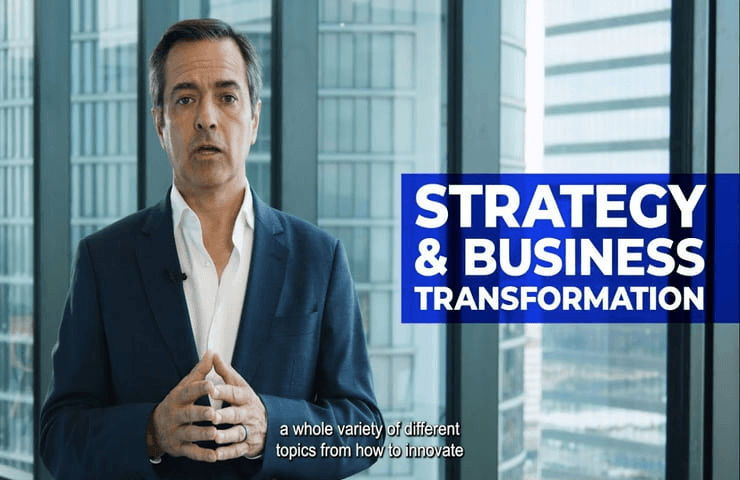
LEARN TO THINK AND PLAN STRATEGICALLY
Developing and implementing business strategies is one of the key components of management. These processes, which are becoming more and more important, require not only an in-depth understanding of the economic, social and competitive environment in which organizations operate, but also a mastery of the internal mechanisms that generate value and the most advanced planning and analysis models.
This concentration provides you with the tools, knowledge and skills that enable business administration and management professionals to develop a strategic mindset that will contribute to the growth of their organization. It delves into advanced business concepts and explores the most critical strategic management theories for the international environment. It also puts into practice leadership, communication and teamwork skills that are essential for working in strategic and corporate environments.
If you choose this concentration, you will learn to think strategically, identify the best alternatives for achieving your organization’s growth objectives through the use of internal or external resources, and analyze the factors that determine whether an implementation will be successful. You will discover how to design strategies that consider key resources and business objectives, and you will be able to plan implementation and track outcomes, using data to optimize the process.
With this concentration, you will be able to contribute to the strategic planning of your organization and become a pivotal element in its transformation, identifying business opportunities and generating value based on your mastery of the latest trends and tools, as well as your knowledge of the economic and competitive landscape
IS FOR STUDENTS WHO ARE…
Ambitious, with the capacity for planning and the drive to become a key player in the growth and transformation of a company. This concentration is for individuals aware of the importance of corporate strategy and willing to develop a mindset that contributes to professional success, no matter their role.
LOOKING FOR…
The opportunity to learn about business diagnostic tools and techniques and the most advanced research models, ready to apply them to corporate planning and development. Acquire knowledge and skills that allow you to master the different strategic factors that influence organizations. You will emerge ready to enter the workforce in a planning-related position. Develop a leadership career in the field of strategic management, contribute to the achievement of business objectives and set yourself apart in the professional world.
TO BECOME A…
- Strategic Management Director
- Corporate Strategy Consultant
- Planning Specialist
- Transformation Manager
- Corporate Development Manager

SUSTAINABILITY MANAGEMENT AND STRATEGY
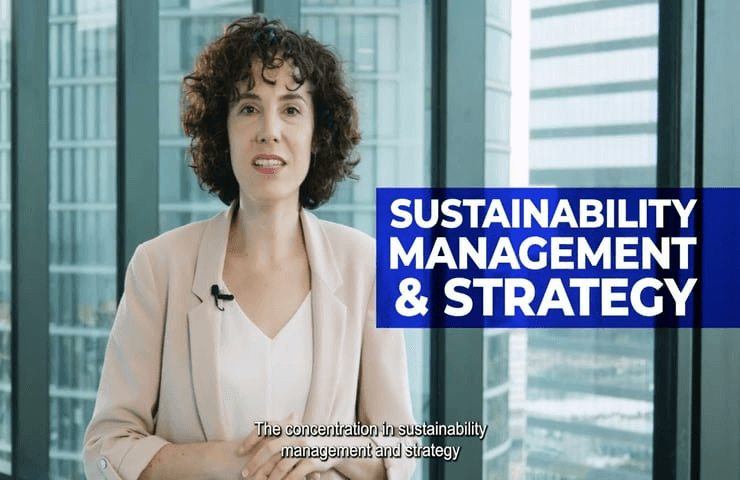
TURN SUSTAINABILITY INTO A SOURCE OF VALUE CREATION
Climate change and other environmental threats have shaped a broader concept of the value that companies generate. Businesses no longer aim only to seek profits for their shareholders, but now also strive to create a positive impact in terms of social, environmental and governance factors in a way that validates their role in society.
This means that there is an increasing demand for professionals who have mastered all aspects of ESG and who know how to integrate these elements into business strategy, creating long-term value for shareholders and society as a whole. There is an increasing demand for professionals prepared to lead the mitigation of impacts and adaptation to new environmental challenges, individuals who know how to improve the resilience of communities and organizations based on the most effective governance models.
These models address, from a practical perspective, the study of scientific principles, regulatory frameworks and the metrics and tools that affect corporate sustainability and ESG management. If you choose this concentration, you will study how companies interact with nature and will explore the different models of sustainable management that businesses are putting into practice. You will learn to identify problems and needs in the field of environmental management and to develop recommendations for action as well as adaptation mechanisms for new environmental scenarios affecting corporate environments.
IS FOR STUDENTS WHO ARE…
Passionate about sustainability and the impact of business on society and the environment, with the ambition to create positive change and help organizations achieve economic advantage by drawing on ESG factors.
LOOKING FOR…
A highly sought-after specialization that teaches you to understand how companies interact with nature and to explore new models for sustainable management. Contribute to decision-making and business planning with your mastery of corporate social responsibility tools and knowledge. Learn to create value for the company and society as a whole through an understanding of social, environmental and governance factors and the strategic instruments needed to manage them.
TO BECOME A…
- CSR Manager
- Environmental Consultant
- ESG Strategist
- Environmental Policy Manager
- CSR/ESG Consultant
- Corporate Strategy Consultant

BRANDING, MARKETING AND SALES

LEARN TO CREATE STRATEGIES THAT MAKE BRANDS STAND OUT
In the global digital context, brand image is one of the main elements that sets a company apart from the rest. Branding and marketing strategies directly affect sales and revenue, and they must be based on a deep understanding of consumers and the latest technology in sales and analytics.
Customer experience, innovation, consumer behavior and content are all key aspects of an effective brand strategy. To develop and implement efficient marketing programs, business professionals need a mastery of the latest IT systems that aid in decision-making and planning. With the dismantling of departmental silos, companies need multidisciplinary professionals who not only excel in the area of management, but who are able to collaborate with departments such as marketing from a deep knowledge of those activities.
In this concentration, you will learn how to identify the differential value of products and services in order to develop branding, marketing and sales strategies. You will master the tools and metrics that measure the impact of a brand’s image to increase its value. Study key concepts and learn how to analyze data and use it as a tool for critical decision-making.
This concentration will help you create a distinctive professional profile that demonstrates your mastery of the most advanced technologies and models, making you stand out in a rapidly expanding area with abundant possibilities for career development. Your multidisciplinary skills will help you drive the growth of your organization and accelerate your career.
IS FOR STUDENTS WHO ARE…
Passionate about sustainability and the impact of business on society and the environment, with the ambition to create positive change and help organizations achieve economic Passionate about customer relations, communication and the strategic aspects of brand development. Brand-aware professionals who want to develop their vision of branding to help their organization succeed. by drawing on ESG factors.
LOOKING FOR…
The opportunity to learn how to harness data to develop brand strategies and architectures, marketing projects and customer experience programs with a direct impact on sales and revenue. Specialize in marketing and obtain a multidisciplinary profile that will help you understand brand image and customer relations to take on a leadership position in areas that combine management and marketing.
TO BECOME A…
- Marketing Manager
- Brand Manager
- Customer Experience Manager
- Branding Consultant
- Brand Strategy Specialist

FINANCE AND INVESTING

MASTER THE FUNDAMENTALS OF FINANCIAL MANAGEMENT
In an increasingly global and digitalized society, the role of financial areas is becoming more important. Management professionals must master the skills and knowledge that enable them to implement successful business and financial solutions using the most efficient methods and technology.
With rigorous academic content and an in-depth quantitative foundation, this concentration has a comprehensive approach that encompasses the most common aspects of financial and business management. Its intensely hands-on methodology provides you with an advanced knowledge of management, statistical accounting, mathematics and other subjects, enabling you to perform financial analysis and make an impact on decision-making and growth in your organization.
If you choose this concentration, you will master the latest financial management tools and concepts that businesses use. You’ll develop robust technical skills that will help you become an international professional with the capacity to generate growth in the financial industry or in finance-related roles in other sectors.
You will also master the latest trends that are reshaping the financial sector, from fintech and sustainable finance to programming and financial derivatives—knowledge that will make your profile stand out and will be invaluable in boosting your career as you enter the workforce. The skills you acquire in this concentration will enable you to contribute to strategy, help achieve objectives and become a key player in your organization’s financial processes.
IS FOR STUDENTS WHO ARE…
Passionate about the world of finance and full of vision and ambition. This concentration is for those who are ready to develop a career in the financial field and contribute to transformation of the sector in a responsible and ethical manner—for the benefit of society and the organization.
LOOKING FOR…
Rigorous training that allows you to master the key concepts and skills of corporate finance and investing, as well as the international context in which they operate and the main global trends in the industry. Learn to use strategic financial management tools and models that will help you to exercise a leadership position in a financial institution or a company’s finance department. Develop experience and knowledge to contribute to the planning and realization of the corporate vision from a financial perspective.
TO BECOME A…
- Financial Analyst
- Finance Manager
- Corporate Consultant
- Financial Advisor
- Corporate Investment Advisor
- Budget Planner
WATCH THIS ENTREPRENEURSHIP MASTERCLASS
Join Waya Quiviger's masterclass on social entrepreneurship; learn sustainable, impactful business models and real-world profit-with-purpose examples. Be a change-maker!

Learning a new language can open up a world of new opportunities
IE University considers multiple language acquisition to be a key element of its educational model, leading to success in both work and study.
The Language Center at IEU is proud to offer students the possibility to study a wide range of languages, including French, German, Portuguese, Chinese, Arabic, Spanish, and English. With such a large variety of options, our students are able to personalize their academic path to meet their future career plans and objectives.

The Language Center at IEU
The Language Center helps students develop their multilingual communicative skills to help them flourish in the international labor market.
THE DUAL DEGREES OF IE UNIVERSITY
Develop a multidisciplinary profile and specialize in two distinct, yet connected fields, by combining another bachelor degree with your studies in Business Administration.

DUAL DEGREE IN BUSINESS ADMINISTRATION & DATA AND BUSINESS ANALYTICS
This dual degree integrates business administration and data analytics seamlessly into one comprehensive program. This bachelor is aimed at individuals who are ready to drive performance within businesses, reach the smartest management decisions and make a positive impact in the corporate world.

DUAL DEGREE IN BUSINESS ADMINISTRATION & DESIGN
The Dual Degree in Business Administration & Design is a demanding program for creative individuals with a passion for innovation and business, looking to produce lasting value within the corporate world. Embark on a unique learning journey where you harness the power of future-forward design, develop unparalleled business knowledge, and gain real-world, hands-on experience.

DUAL DEGREE IN BUSINESS ADMINISTRATION & FASHION DESIGN
Embark on a transformative five-year journey with the Double Degree in Business Administration & Fashion Design at IE University. This program is tailor-made for visionary individuals passionate about both business and creative expression, offering a dynamic curriculum that equips you with a robust foundation in business administration and fashion design.

DUAL DEGREE IN BUSINESS ADMINISTRATION & INTERNATIONAL RELATIONS
The Dual Degree in Business Administration & International Relations offers a comprehensive and practical study of international affairs and solid business skills that will give you a global perspective of economic, political and social interactions.

DUAL DEGREE IN BUSINESS ADMINISTRATION & LAWS
This program prepares students for a range of careers in law and business, and to work in a dynamic corporate environment. This program is marked by the fundamental elements of IE University: academic excellence, an entrepreneurial spirit, and an international environment.

DUAL DEGREE IN BUSINESS ADMINISTRATION & HUMANITIES
The Dual Degree in Business Administration & Humanities offers you a unique and comprehensive educational experience that merges the analytical and critical-thinking skills from the Bachelor in Humanities program with the practical business acumen from the Bachelor in Business Administration program.

Dual Degree in Business Administration & Computer Science and Artificial Intelligence
The Dual Degree in Business Administration & Computer Science and Artificial Intelligence is a cutting-edge, international program that prepares you to push the limits of new digital technologies and excel in the global markets.
INTERNATIONAL ACCREDITATION
IE Business School has been granted the prestigious “Triple Crown Accreditation” by the most highly respected business school accreditation associations. This honor is shared with a select few, with a mere 97 business schools worldwide (less than 1% of all business schools in the world) as of March 2020. The “Triple Crown Accreditation” certifies that the IE Business School's unique education model—based on innovative teaching methodologies and a commitment to breaking boundaries—is among the best in the world.
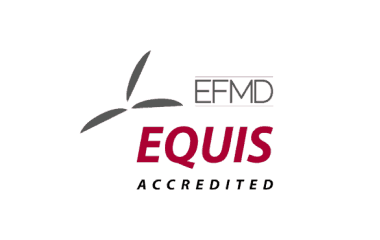
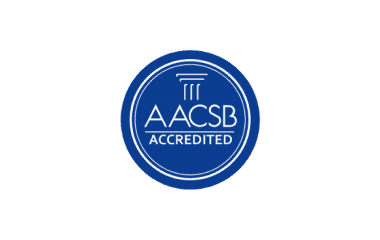
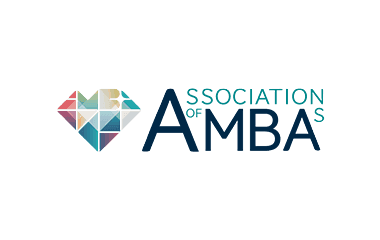
COMPETENCES
Basic competences
GENERAL COMPETENCES
- Analyze companies’ needs to adapt instruments, products and services to their specific features.
- Organize and plan for situations that pose a challenge for decision-making in light of a company’s internal problems.
- Collect, analyze and summarize information from different sources in order to later apply it to business management.
- Ability to communicate in English orally and in writing.
- Adapt a company’s products and services using data analysis instruments.
- Define mechanisms enabling adaptation to new situations in the business environment.
PROGRAM-SPECIFIC COMPETENCES
- Apply solutions that are efficient in a competitive market based on national and international economic knowledge.
- Manage a small company or organization, understanding its competitive and institutional position and identifying its strengths and weaknesses.
- Understand the duties of the different management bodies of a medium or large company or organization in order to perform the management tasks entrusted to it.
- Evaluate a company’s current situation and foreseeable future in terms of specific situations and markets, using relevant records to enable decision-making.
- Create management projects for a company as a whole or its different functional units, identifying relevant economic information sources and their contents.
- Recognize a company’s economic, global and structural situation within the labor market in which it operates, including the subject and/or the company.
- Interpret the current socioeconomic context based on basic historical, philosophical and political knowledge.
- Apply the appropriate business diagnostics tools and techniques to each stage of development in order to obtain better evaluation and decision-making at a company.
- Use the most appropriate models and research methods for a given company in light of its context and normal spheres of business development.
- Use knowledge of information and communication technologies in all professional activities.
- Apply professional judgment based on using technical instruments to analyze problems.
- Identify and manage the conditions enabling employees’ personal development in everyday strategic business settings.
- Identify the differences, problems and needs present within an organization in order to properly manage them.
- Access, recognize and use relevant data and information in business settings.
- Create recommendations for action by applying the legal framework in force.
- Use cost accounting to make company decisions in collaboration with different corporate stakeholders.
- Apply novel business ideas in order to design an entrepreneurial reality.
- Use market strategies in different sectors analytically.
- Compile, distribute and present statistical data for software development in economics settings.
- Apply IT solutions to corporate issues, taking the latest advances in the sector into consideration.
TRANSVERSAL COMPETENCES
- Identify the main cultural identity traits that characterize today’s world by understanding the main contemporary ideological trends.
- Behave professionally in accordance with the core principles and ethics of the profession. Manage unforeseen situations by being able to adapt to organizational changes.
- Use knowledge of the discipline to analyze and evaluate current situations.
- Form a part of interdisciplinary and multicultural teams to achieve shared goals in a diverse environment.
- Work actively in an international context.
APPLICABLE REGULATIONS OF THE PROGRAM
Read our blog
Frequently Asked Questions
How many subjects are there in BBA?
The Bachelor in Busine Administration at IE University consists of 60 credits of basic training courses, 108 credits of mandatory courses, 60 credits of elective courses, and 12 credits for the Capstone project.
Can I complete BBA in 2 years?
It is unlikely to complete a Bachelor's in Business Administration (BBA) in just 2 years, as most BBA programs are designed as four-year undergraduate degrees.
How many years is a bachelor in business administration?
A Bachelor's in Business Administration (BBA) degree at IE University takes four years to complete as a full-time undergraduate student.
What do you learn in bachelor in business administration?
The Bachelor in Business Administration (BBA) degree at IE University provides students with a broad range of knowledge and skills in various aspects of business management and operations. Some of the key subjects covered in a BBA program include accounting, finance, marketing, economics, management, business law, operations management, and organizational behavior. Throughout the program, students typically develop critical thinking, problem-solving, communication, and teamwork skills, as well as an understanding of the ethical and social responsibilities of businesses in today's global economy.
What are the elements/levels of bachelor in business administration?
At IE University the Bachelor in Business Administration (BBA) degree consists of a broad range of courses in various areas of business, such as accounting, finance, marketing, economics, management, operations, and organizational behavior. In addition to coursework, students have opportunities for experiential learning through internships, cooperative education, or capstone projects. IE University also offers opportunities for students to specialize in a particular area of business, such as entrepreneurship, international business, digital business, or brand, marketing and sales.
